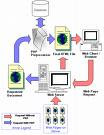
People can increase their intelligence by doing some simple memory training, reveals a study by Swiss and American researchers.
Practice makes perfect. Someone who likes to waste time completing crossword puzzles will gradually have less and less trouble doing so. Someone who plays the same computer game each day will see that her/his score is gradually increasing. Unfortunately, that progress is probably only applicable to exactly that which is being trained. Someone who is good at crossword puzzles is not necessarily good at computer games; just as an experienced gamer does not have to be great at crossword puzzles.
In other words, humans can be trained to learn certain tricks or skills, but to increase something as broad as intelligence, the ability to reason, to solve problems, to think in abstract terms, to orient oneself in a space, etc. is a very different issue indeed.
Psychologist Susanne Jaeggi and colleagues of the University of Michigan (US) and the University of Bern, Switzerland, now seem to have found a type of memory training that does not only improve someone's memory, but also the intelligence. They describe this in the Proceedings of the National Academy of Sciences (PNAS).
The psychologists gave 70 adult subjects an intelligence test, after which they were divided into two groups. The people in one group followed a memory training that took eight, twelve, seventeen or nineteen days. At the end of the training period, they had to complete another intelligence test. The people in the other group did not receive any training, but they also had to complete a new intelligence test after eight, twelve, seventeen or nineteen days.

The training consisted of two synchronous memory tests every day. Boxes were projected on a screen. Every 3 seconds they jumped to another spot. The subjects had to press a button of the box remained in the same spot as two projections earlier. At the same time, they heard consonants through a headset. When they heard the consonant they had heard to letters earlier, they had to press a button as well.
When the test subjects became better at doing the test, it became gradually more difficult. Instead of looking at the position of the box 2 projections earlier, they had to press the button when they saw the same composition as three, four or five projections earlier. Same thing for the audio task.
During the training, the test subjects became steadily better at the taks, wrote the psychologists in PNAS. Those who had the most training - nineteen days - turned out to be the best in the end.
According to Jaeggi and colleagues, it is remarkable that the subjects did not only excel in the task they practices but also that they had the highest score with the second intelligence test. The average score after the first test was ten points. After nineteen days of training, it was four to five points higher. Even the less well trained test subjects were all better than the people in the control group that did not do any memory training.
It was already known that memory and intelligence have some sort of connection. The psychologists think that the increase of intelligence has something to do with the fact that the memory tests were not all equally difficult. Because of that the test subjects could not activate their "autopilot", they had to stay alert. The fact that two tests, one visual, one auditory, had to be done at the same time may also have something to do with it.
Regardless of this, we think that our conclusions are very relevant fo applications in schools.It is pity however, that the test subjects did complete intelligence tests, but not IQ tests. Because of that, it is unclear how much their IQ has risen during this period.













